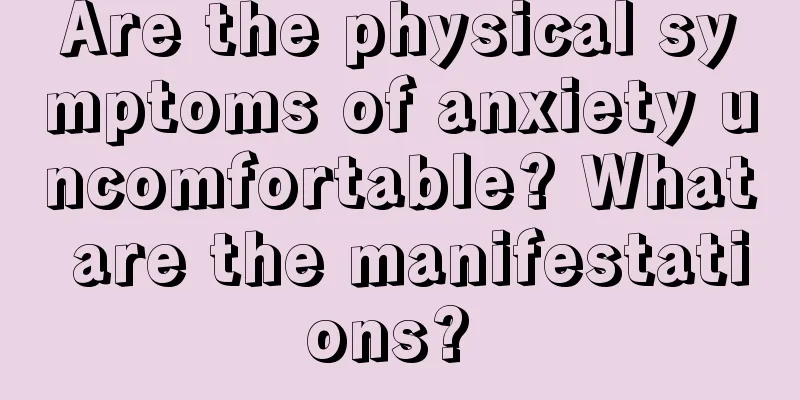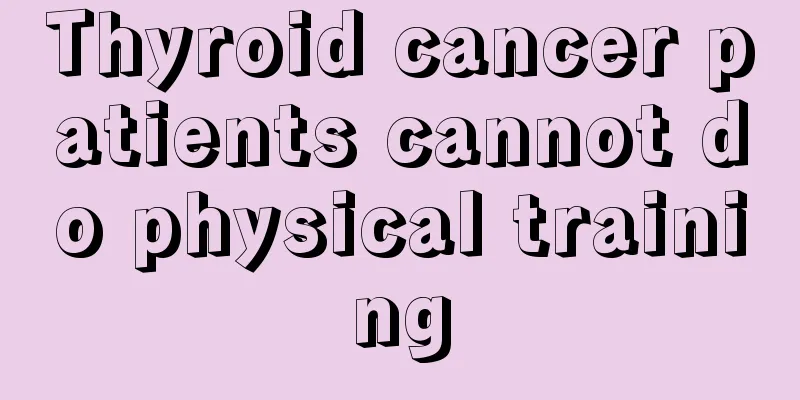Are the physical symptoms of anxiety uncomfortable? What are the manifestations?

|
Anxiety somatic disorder is the manifestation of anxiety symptoms caused by some physical diseases. That is to say, because of the cause of the disease, the patient has a very heavy psychological burden, and this psychological burden in turn reacts on the patient's body, causing some symptoms, often causing patients to have difficulty breathing, dizziness, rapid heartbeat, and some urinary system symptoms, leading to autonomic dysfunction, etc. 1. Respiratory symptoms: Patients feel difficulty breathing, mainly with the subjective feeling of insufficient inhalation, chest tightness, and difficulty breathing. They are very likely to experience sighing-like breathing and even feel suffocated. 2. Cardiovascular symptoms: Some patients may feel dizzy, have a rapid heartbeat, and high blood pressure; some patients may experience precordial pain, stabbing pain, dull pain, etc. These symptoms may last for several hours and are accompanied by local tenderness; some patients may experience panic and palpitations. 3. Digestive system symptoms: In addition to the loss of appetite mentioned above, people with anxiety disorders may also experience dry mouth, loss of taste in the mouth, nausea, vomiting, abdominal pain, diarrhea, bloating, indigestion and constipation. At the same time, they may feel discomfort in the upper abdomen but cannot clearly describe the specific feeling. 4. Urinary system symptoms: Some male patients will experience frequent urination, urgency, erectile dysfunction, and sexual loss; female patients will experience menstrual disorders and dysmenorrhea. 5. Autonomic nervous system symptoms: Physical anxiety is often accompanied by excessive sweating of the palms and soles, and in acute attacks, there is often profuse sweating and other symptoms of autonomic nervous system dysfunction. The reason for physical anxiety is closely related to the function of the autonomic nervous system. Anxiety itself is an emotional response and will be affected by the autonomic nervous system. Studies have found that when the autonomic nervous system functions abnormally, such as hyperactivity, the organs controlled by it will experience somatic reactions. 6. Muscle movement system symptoms: The more common type of headache is contraction or compression headache caused by muscle tension in the head, neck, face, limbs, etc., which is more obvious in the forehead or occipital area. In addition, the neck, shoulders, waist, and back may feel stiff and painful, and in severe cases, tremors and convulsions may occur. It is necessary to relieve patients' mental concerns, help them analyze the factors that may cause the disease, gradually eliminate unnecessary fears and concerns, and build and restore confidence in overcoming the disease. If necessary, anti-anxiety and anti-depressant drugs can be used for treatment. Find out the cause of the patient's disease, determine the location and extent of the lesion, and provide targeted treatment. |
<<: How to relieve severe neck pain
>>: What are the causes of dizziness in the morning
Recommend
Can aloe vera gel be used for hair removal? The correct way to remove hair
Nowadays, many girls don't want to have some ...
Which foods can prevent prostate cancer?
Prostate cancer is a disease that is extremely ha...
Rotavirus vaccine side effects and contraindications
After the birth of a newborn, the family must be ...
What should I pay attention to when I have swelling
When cysts occur in the body, special attention s...
Is pole dancing easy to learn?
In life, many people like to watch pole dancing, ...
What are the types of tongue cancer? What are the clinical manifestations of tongue cancer?
Tongue cancer can be divided into papillary type ...
What causes lower abdominal pain when urinating?
Many people always experience discomfort when uri...
The principle of using lard to reduce swelling
Lard can be used for cooking and making a lot of ...
Which tests can confirm liver cancer? These tests can detect liver cancer
Liver cancer is a disease that is highly harmful ...
What are the main symptoms of lung cancer? These are the common symptoms of lung cancer
During the treatment of lung cancer, some people ...
Ground-glass opacity indicates several stages of lung cancer
What stage of lung cancer is ground-glass opacity...
Why do I often blush and feel hot
Many people are troubled by frequent blushing and...
What are the medicinal liquors for traumatic injuries
When it comes to injuries from falls, the use of ...
What can I eat to get diarrhea quickly
We know a lot about how to stop diarrhea quickly,...
What are the effects of moxibustion patches
As the name suggests, moxibustion patches are lik...









